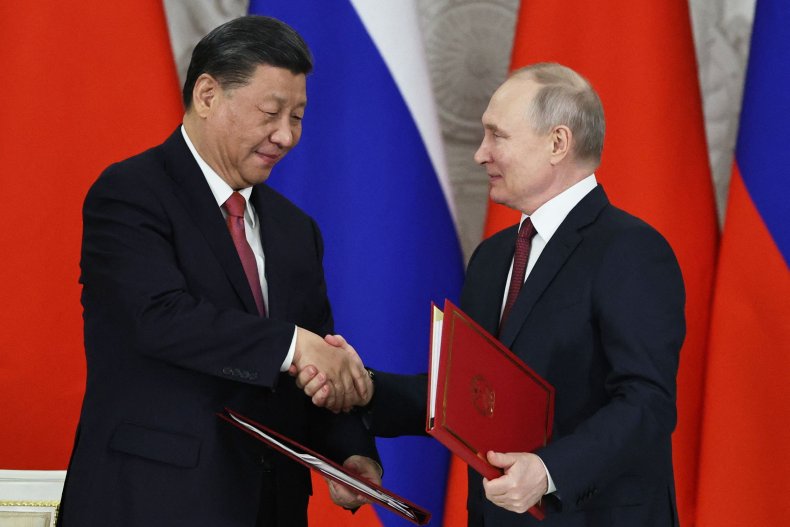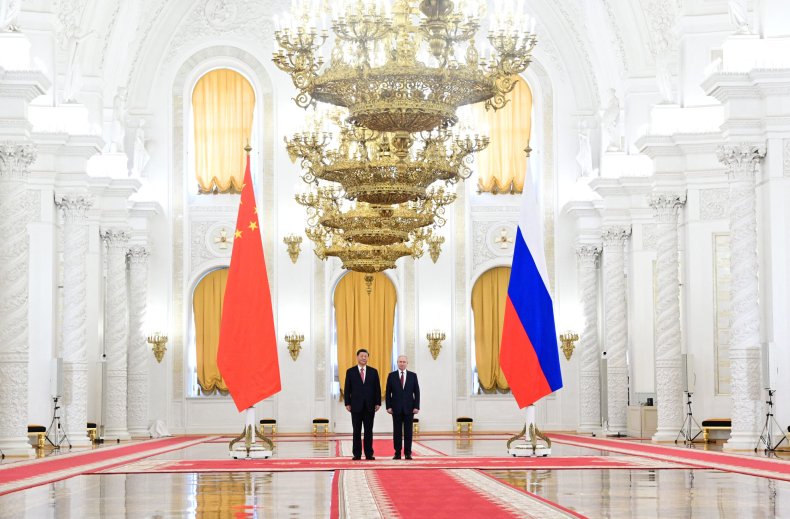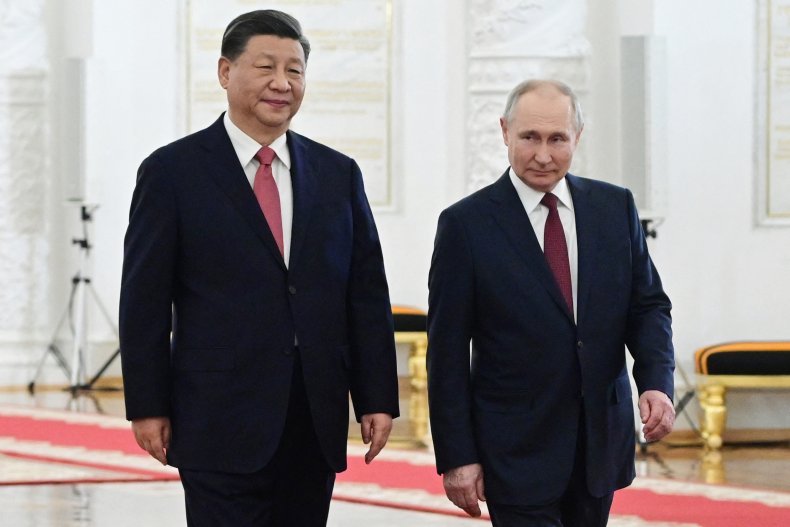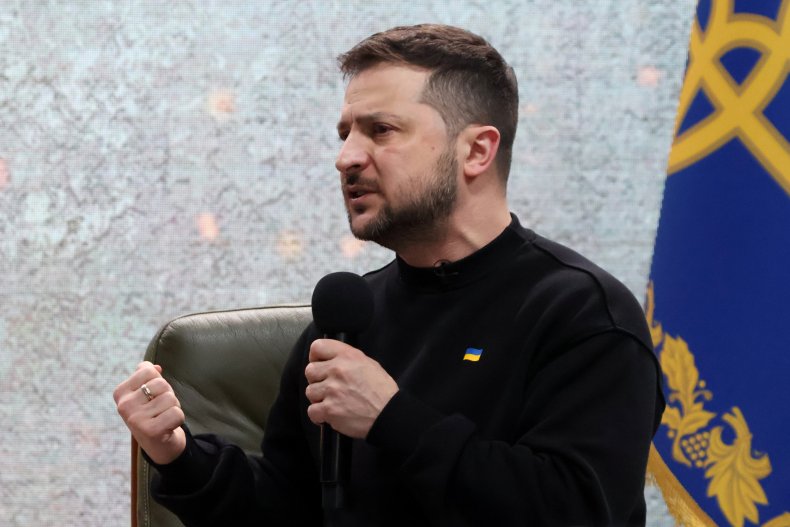Chinese leader Xi Jinping departed Moscow on Wednesday having flattered his "dear friend" Vladimir Putin with a high-profile state visit at an otherwise delicate moment for Russia's president, whose campaign to make Kyiv bend the knee has run far over schedule.
Putin is now the first leader of a permanent member of the U.N. Security Council with an arrest warrant to his name for possible war crimes. For his troubles, his Chinese opposite number was received with a red carpet, brass brand, big flags, and small tables.
Xi's strides into the Kremlin were effortless; China's third-term president is comfortable with his reaffirmed political stature, confident in Beijing's position on the international stage, and convinced of his decision to back Putin to the hilt. He even endorsed Putin's electoral prospects before the Russian leader himself was ready to announce another run for the office he has held on and off for two decades.
Xi, who is expected to sit atop the Communist Party's hierarchy for at least another five years, had described his three-day visit with Putin as "a journey of friendship, cooperation, and peace." That was indeed the order of priorities, according to their public remarks.
Despite some early expectations that Xi would elevate the Chinese peace proposal for Ukraine, the yearlong war became something of an afterthought as the two leaders put on an unmistakable display of unity in the face of Western pressure. The talks did little to bolster Xi's peacemaking credentials, Ukrainian lawmakers said.
"China is not interested in Ukraine winning the war and returning all its occupied territories. Victory for Ukraine would mean for China victory for democracy and the defeat of its strategic partner without limits. China will do everything to prevent it from happening," Oleksandr Merezhko, a member of the Ukrainian parliament, told Newsweek.

"The China-Russia relationship is mature, stable, independent, and resilient," said a Putin-Xi joint statement to cement their comprehensive strategic partnership of coordination for the new era, a title Beijing reserves exclusively for its quasi-alliance with Moscow. "Russia needs a prosperous and stable China, and China needs a strong and successful Russia."
They again declared support for one another's "core interests"—sovereignty, territorial integrity, security, and development. And "large-group talks" with Russian delegations led by cabinet-level officials resulted in a second joint statement on cooperation across national industries through 2030, China's foreign ministry said in a readout.
Xi on Top
"China and Russia regard each other as priority partners for cooperation, always respect each other, and treat each other as equals, serving as a model for major power relations today," Xi and Putin agreed.
At home, however, China's leaders are cognizant of the Kremlin's moment of relative vulnerability and the timeliness of their diplomatic relief. State media has presented Xi's trip as having offered instruction and counsel to his Russian counterpart, according to independent scholar Philip Cunningham, author of the Substack newsletter China Story, which watches the carefully choreographed news programs of Chinese state broadcaster CCTV.
"The optics of the summit clearly favored Xi. Any talk of equal footing is just rhetorical," Cunningham told Newsweek. "On CCTV, the meeting between the two mostly focuses on Xi talking. What surprised me most was not only that Putin can be seen dutifully taking notes, but CCTV repeats this abject clip about 10 times, as if Putin were just a schoolboy."
"Xi," said Cunningham, "never takes notes."
Putin also committed to more market access for Chinese companies than was granted to Russian industry actors, according to Russia watchers who scrutinized the multi-year agreements covering energy, finance, trade, technology, agriculture, space, and more. The deals will increase Russia's growing use of China's yuan for export settlements, currency holdings, and securities exchanges amid restricted access to the dollar and euro.
"Russia's economic isolation has created lucrative business opportunities for Chinese firms, many of which are state backed. Beijing remains keen to provide Moscow with a financial lifeline, so long as it can avoid eliciting a strong U.S. response in the process," said Craig Singleton, a senior fellow at the Foundation for Defense of Democracies.
"Perhaps most interesting is that China's actions to date appear aimed at ensuring Russia has what it needs to sustain its wartime economy—not actually win the war," Singleton told Newsweek.
"For its part, Russia can turn to few other countries to help bolster its economy—and Beijing knows it, which is why China will continue to extract lucrative concessions from Russia on a range of fronts," he said. "Yet, China runs the real risk of being seen as taking advantage of Russia's economic isolation for its own benefit, which could potentially aggravate long-standing tensions between Chinese and Russian elites."

Beijing extracted meaningful political benefits, too. After a year of Chinese equivocation on Russia's decision to puncture Europe's long peace, Putin appears more willing than ever to back Xi's own security concerns in Asia, which also happen to revolve around the postwar military posture of the United States and its regional allies.
Their joint statement, which identified America as the main antagonist, called for the withdrawal of nuclear weapons deployed overseas and warned of "the consequences and risks to regional strategic stability" associated with AUKUS, the agreement by the U.S. and U.K. to share nuclear-powered submarine technology with Australia.
"The two sides also express serious concern about NATO's continued strengthening of military-security ties with Asia-Pacific countries, which undermines regional peace and stability," said the Russian and Chinese leaders. "The two sides oppose the piecing together of closed and exclusive blocs in the region to manufacture bloc politics and camp confrontation."
Putin's Safest Bet
Russia's ongoing invasion was beset with errors from the start: It overestimated the readiness of its own troops, underestimated Ukrainian resistance, and misread the West's willing to inflict long-term economic pain, often at its own immediate expense. But amid a sea of miscalculations, Xi was Putin's one good bet.
"When discussing topical international and regional problems, the president and I affirmed that Russia and China's views on them are identical or very close," Putin said of Xi. "We can see that the practice of applying illegitimate, politically biased sanctions and other restrictions, and the use of other means of unfair competition in the economic struggle, is expanding."
Subject matter experts say it speaks to a growing convergence in the strategic outlook of the two capitals—a common goal to push back against the U.S.—while those who believe Moscow is unwittingly resigning itself to a lasting place in Beijing's orbit may also be overlooking Putin's conclusions about the potential trade-offs.
"Russia is in a full-scale war and an economic war—these are peculiar conditions. Russia is making various concessions on bilateral investment, and China is swinging in with a huge level of public diplomatic, financial and economic support for a war that Russia is increasingly framing in existential terms. That's a pretty significant framework," said Andrew Small, a senior fellow with the German Marshall Fund's Indo-Pacific Program.
"The realities of the economic situation for Russia mean it is where it is. But that was the bet on the Russian side: They decided it was worth it to take actions that were going to lead to an extremely damaging confrontation with the West because they had China. They weren't left with no alternative—they were left with a Chinese alternative," Small told Newsweek.
"It tilts the balance of power further in China's favor, but Russia made a decision that it was better to accommodate the reality of growing Chinese power than to chafe against it," he said. "This was untested territory to count on China in a drawn-out war under considerable pressure from the West. The visit is a striking public gesture of support in a moment of high sensitivity."

For both countries, the precedent creates a set of mutual expectations that could see Moscow back Beijing in similar circumstances in the future, especially in a crisis involving Taiwan. But even then, questions about China and Russia in a formal alliance may be misplaced.
"The two sides noted that the China-Russia relationship is not the kind of military-political alliance of the Cold War, but transcends this model of state-to-state relations and is characterized by non-alliance, non-confrontation, and non-targeting of third countries," said the joint statement, which described the deepening partnership as a "strategic choice" based on common interests.
"The model that China has in mind is flexible forms of mutual support that strengthen the hand of each party and can extend further to involve extremely deep military and intelligence cooperation, but which comes without obligations," Small said. "Nothing needs to be put on paper; nothing needs to be formally agreed. It only needs understanding between the leaders."
"Binary rhetoric about whether it is or isn't an alliance misses all the gradations of how China is actually thinking about these partnerships and what the two sides actually need," he said. "What did Russia need from China? They didn't need a treaty commitment. They needed China to provide a financial, economic and political backstop for what Russia is doing. That's what China is doing now for Russia."
Kyiv's Skeptics
China is not interested in Ukraine winning the war and returning all its occupied territories.
The highly anticipated summit was light on details about the situation in Ukraine. Putin said Beijing's vague peace proposal "correlates to the point of view of the Russian Federation," and accused Kyiv and its Western partners of not being ready to negotiate.
Putin has acknowledged that a peace deal might be required to end the fighting, but has shown no indication of jettisoning his maximalist war goals that would leave Ukraine a rump puppet state in a Russian imperial sphere of influence. Putin's troops are still on the attack, and Russian kamikaze drones again dived down on Kyiv as Xi wrapped up his sumptuous visit.
China's blueprint calls for a cease-fire that would leave Russian troops in occupied Ukrainian territories—an outcome anathema to Kyiv—and an end to any sanctions on Moscow not approved by the U.N. Security Council, where both China and Russia have vetoes. It also expressed its opposition to nuclear war, encouraged dialogue and restraint without acknowledging Moscow's aggression, and urged recognition of Russia's "legitimate security interests and concerns."
Despite the paucity of substance, Ukraine's President Volodymyr Zelensky has remained publicly open to discussions with Beijing about its peace plan. The president has so far only received the cold shoulder from Xi, but is wary of any falling-out with China— Ukraine's largest trading partner before the war—that might push it deeper into the Kremlin's corner, and perhaps open the door to direct military assistance for Russia.
"China is absolutely not neutral," said Merezhko, who represents Zelensky's Servant of the People party and chairs the parliament's foreign affairs committee. "It conducts military exercises with Russia. It openly blames the West and NATO, not the actual aggressor. Russia and China are the core of a coalition waging hybrid war against democracy and undermining the rules-based order."
"I didn't expect much," he said of Xi's state visit. "Chinese bureaucracy is very slow. They will just repeat old propagandistic mantras about 'peace.' Maybe Xi will call our president but just to repeat earlier messages."
As for Beijing's peace proposal, Merezhko said it presented "no hope."

Bohdan Yaremenko, also a member of the parliament's foreign affairs committee, said that expectations were already low in Kyiv. "No one was anticipating anything of the Chinese," he told Newsweek. "For a global superpower to take a year's worth of time thinking about the situation and then to deliver what was delivered is very tragic."
He expects continued, if limited, diplomatic activity. "I have no doubt that President Zelensky will talk to Xi," he said. "But it's just a reflection of our understanding that it's better to have some contacts with China to be able to send them a signal that we really hope they will not change their policy in terms of supplying major military equipment to Russia."
Ukrainian hopes that China could press Russia into abandoning its disastrous gambit appear to have been misguided, but many understand Zelensky's abundance of caution. Officials in Kyiv can be expected to keep playing nice with Beijing to avoid the nightmare scenario of Chinese weapons on the battlefields of Ukraine.
"We should do everything in our power to prevent China from supplying weapons to Russia, and maybe we should recalibrate our thinking and think about realistic goals, even if we don't like them," said Inna Sovsun, a member of Ukraine's parliament and the deputy head of the liberal Golos party.
"We have to think about the maximum we can achieve. Maybe the more realistic scenario is putting pressure on China, so that they will continue to say that they are neutral, and that they're not supporting either side," Sovsun told Newsweek.
Kyiv is far from the only capital in which China's peace proposal has fallen flat. Officials in Washington—Ukraine's strongest international backers in the war thus far—argue the document could have ended after the first point: respect for the U.N. Charter.
John Kirby, a senior spokesperson for the White House's National Security Council, rejected Russia's description of China as "objective and impartial." "If China wants to play a constructive role here in this conflict, then they ought to press Russia to pull its troops out of Ukraine and Ukrainian sovereign territory."
"But I don't think you can reasonably look at China as impartial in any way. They haven't condemned this invasion. They haven't stopped buying Russian oil and Russian energy," he said on Tuesday. "President Xi saw fit to fly all the way to Moscow, hasn't talked once to President Zelensky, hasn't visited Ukraine, hasn't bothered to avail himself of the Ukrainian objective."
"And he and his regime keeps parroting the Russian propaganda that this is somehow a war of the West on Russia, that it's some sort of existential threat to Mr. Putin. That's just a bunch of malarkey. Ukraine posed no threat to anybody, let alone Russia," Kirby said.
Do you have a tip on a world news story that Newsweek should be covering? Do you have a question about China, Russia or Ukraine? Let us know via worldnews@newsweek.com.








